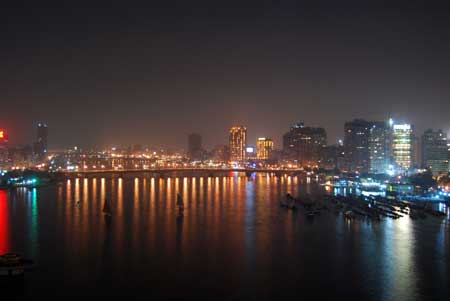Intro.
The airport was no different from other airports, long corridors and empty , where no one stops, that lead to the hall of the mechanical gateways, where everyone expects to have no lost their luggage, but this time, before going out, we had to go through the control of passports . Within his cabin, the guard sealed passports with rythmic and repeated blows of tampon, he look us something frown, as if we were partly responsible for the tendinitis that undoubtedly he has to suffer in silence. Then suddenly he made to disappear our documentation behind a curtain that divides the cockpit, where, at least, two or three women dressed almost nuns-like, piled inside that cubicle, they made hardly some kind of testing before returning us, the passport and calm.Like almost everything man, with an identical mustache and haircut, the guide from our agency was waiting for us smiling, with a poster aloft, putting to us aside after a short greeting, as soon as we went out from the metal detector.
At night, travel by minibus to the hotel was a little shocking, move around the city at that time seemed like a really risky thing, an alluvion of vehicles, demanding the pass each other, playing repeatedly their horns, crowded the highways in all directions, while passers with children by the hand, they crossed indolently among the traffic, apparently risking their lifes. I did not see any traffic light, it appeared that there were none, not seemed to be necessary, there was no evidence of anxiety on the faces of those involved, nor I saw any accident , it was surprisingly the normality.
The microbus stopped at a barrier at fifty meters from the hotel entrance, then a soldier with a trained dog was lifted from a kitchen´s chair, and a little bored, they walk around the vehicle, the guide told us,in jocular tone, that they only were seeking bombs. Soon after, we had to cross under the strict supervision of a police officer, a scanner at the entrance to the hotel, I remembered that phrase that the Doctor of Health Abroad said, a few days before , “do not worry, it’s a very peaceful country.” We just leave from the scanner, when in the center of the reception, an elegant circular great room with large windows giving the river, suddenly, we meet to a woman, singing a soft classical melody while she was playing piano at the same time, something which I found disconcerting given the circumstances. I realized that I was an “happy angel” when I paid 30 euros for a visa, to enter the country, on which it had printed that it cost $ 15.
The hotel was splendid, sited in the heart of the city, nestled at the tip of an island in the middle of the river, from what it takes its name. We could sleep there only one night. We breathe, literally, when finally climbed into the room, so tired, after nine hours between shipments, waiting at airports, flights, we just would have four or five hours to rest before starting the next day’s excursion. Until then, everything had been pure routine, but in reality and despite everything, we felt that it had gone quite well. The hotel terrace offered a breathtaking view of the city, the circulatory frenzy seemed to have waned somewhat at this hour, I spent a few minutes away out there, but what kept me there was not the pretty reflection of the lights in the water, it was to know that behind the mist night, behind the lights of the city, within walking distance, on the outskirts, from several thousand years ago, what so far only had been the subject of many hours of reading.
I.
Within the triangle formed by the ancient cities of Iunu (Heliopolis), Jem (Letopolis) and Men nefer (Memphis), it is deploying on the bisector from the vertex of Heliópolis to the incenter, Cairo (Al Qahira Masra, too) is also the point from which it opens up the arms of the Nile delta.
Letopolis acquired dominance, with the approval of the holy city of Heliopolis, after the Coalition Osiríaca of Busiris in Lower Egypt, was defeated by the coalition of Nubt from Upper Egypt, in favor of Seth. Great changes occurred at this time, in the form of government of Lower Egypt and eventually into people’s lives, from the times of the social revolution of Anedjti in Busiris, where the kings were elected by the assembly, before the reign Osiris‘s own (yes, earlier) who died at 28 years of his mandate during a battle against the South, until the establishment of hereditary monarchy during the regency of Horus in Letópolis. Changes that did not like in the coalition and caused the sedition of Hermópolis (Per Djehuti) and Sais, and that only forged with the definitive establishment of monarchy of Horus (in the style of Letópolis) in Buto, we do not know how. We know that the reason for the discord was Abydos, Busiris´s colony in Upper Egypt, it was founded by Anedjti to support the expeditions in search of gold. Over time most of the economically strong cities in the delta, founded colonies in Middle Egypt, mainly to protect the traffic of their goods. The war was inevitable and the victory of the coalition under the mandate of Buto against the feudal lords of the South in Edfu, if did not result in the annexation of Upper Egypt, meant the destruction of feudal power. Violent social movements in Upper Egypt rose to Min (god of agriculture at the Osiris style ) to the rank of official religion at the expense of Seth, begining in Ipu (Panopolis), where someone outside the nobility, came to power by a similar process which led to Anedjti in Busiris to wrest control of the upper classes and with the probable support of Buto spread their revolution to Gebti (Koptos), which was important for its connection to the Wadi Hammamat, the route of the caravans to the Red Sea, from there the revolt is extended to all cities in the South, which all of them systematically adopted the new cult of Min, a situation that led to the advent of the monarchy in Nekhen (Hierakompolis) Two states, Nekhen and Buto, a single religion, but did not last long, The absolute power of Buto soon became unbearable for most of the nomos of Lower Egypt that eventually split off, moment that Asian tribes took advantage to invade the territory. The prints from the handle of the knife of Gebel el-Arak seem to see these events. The Hierakompolis monarchy moved his capital downriver, to Abydos (Tinis), ready to face the situation.During this period, was born the first dynasty unified the two lands, monarchy of the south, from its new capital at Abydos took control, struggling with the Asians, and conquering at the same time the delta´s lands. in the Narmer´s palette, you can see the ten decapitated bodies of the magistrates of Metelis (Hermopolis mikra), the city that led the last resistance after that Buto was dismantled. The kings of the south were the first to use the two crowns, the bee of Sais and Buto, with the cane of Nekhen, hieroglyphic symbols of the kings of Upper and Lower Egypt. All these facts are prior to the year -5000, and contemporary with social phenomena that marked the end of the Uruk´s age in Mesopotamia, prior to the establishment of what has been called the Archaic Period dynastic.
References: “History of Ancient Egypt”, Jacques Pirenne.

